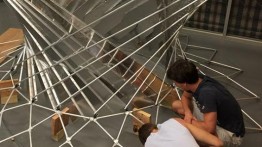Dorit Aviv Co-Hosts Princeton University's ULTRASTRUCTURES Conference
POSTED ON: September 19, 2015

Photo courtesy, Princeton University and Ultrastructures conference
Faculty partner at The Cooper Union Institute for Sustainable Design and assistant professor at The Irwin S. Chanin School of Architecture, Dorit Aviv is co-hosting ULTRASTRUCTURES with Forrest Meggers and Axel Kilian at Princeton University on September 19th, 2015. During this conference, she will present her research and prototype of a passive cooling oculus / operable structure, developed in collaboration with Forrest Meggers, with the support of a Tides Foundation grant and the Andlinger Center for Energy and the Environment.
ULTRASTRUCTURES is a conference and exhibition dedicated to exploring the union of formal design processes at the macro scale and fundamental physical processes at the micro scale. These physical processes lie in the domains of thermodynamics, heat and mass transfer, water filtration, and material science. The two domains are spanned with the aid of computational tools that enable dynamic analytical inputs linking them to the design process. The conference will include architecture and engineering faculty and researchers from various universities. For a list of speakers and event details: https://soa.princeton.edu/#1103
The conference is free and open to the public.




